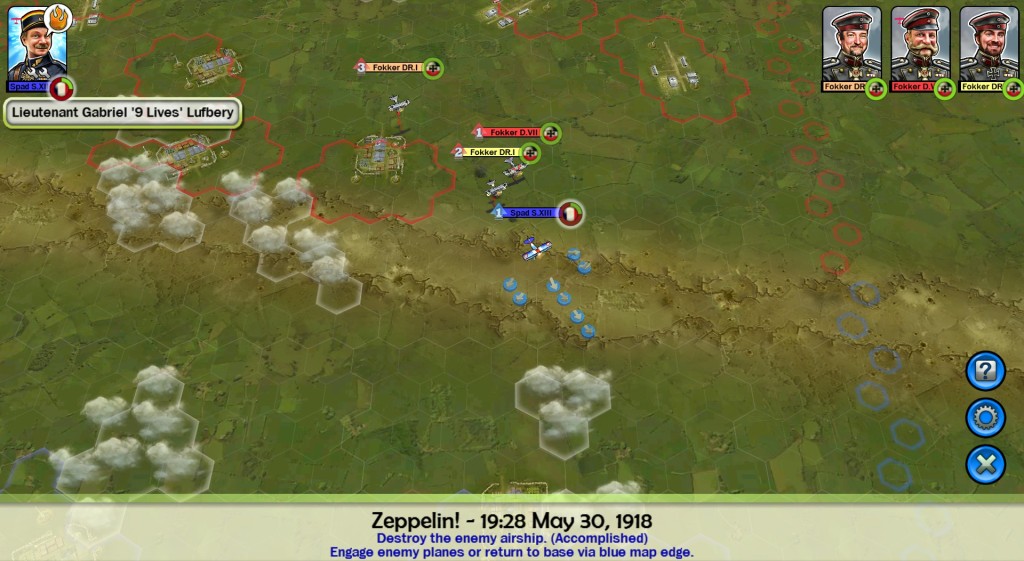At first, I didn’t like Sid Meier’s Ace Patrol very much, its designer notwithstanding. On paper, this turn-based, TRPG take on World War I air combat had it all: a clean, simple interface; pilots who levelled up and learned new manoeuvres; and those manoeuvres! Half-loops followed by rolls when I wanted to get away in a hurry, or full loops when I wanted to turn the tables on a pursuer. Climbs into the cloudbanks, then dives into the midst of German patrols. But everything was so boringly easy. Where was the challenge? Where was the incentive to learn how to use those manoeuvres?
Then I cranked up the difficulty.
And minutes later, as my pilots fought for my lives, the realisation hit me: this game is Diet XCOM.
I mean that in several ways. This was originally a mobile game, and it shows: Ace Patrol is very short by strategy game standards – you can finish the campaign in a few hours, less time than a single match of Civilization V. Its production values are modest; there isn’t even any music (1). It’s cheap (although Australians, beware regional pricing). And its mood is far lighter than XCOM: the planes are painted in bright, cheery colours, and the pilots can’t permanently die. They even seem to realise this – look at how they’re grinning in the screenshot!
But the resemblance is there. Like XCOM, Ace Patrol really must be played on an appropriate difficulty setting; once I dialled up the difficulty I found myself thinking about the interplay between tactics and equipment. My French SPADs were faster but slower-turning than the German planes; that encouraged me to run for home once I completed objectives, instead of sticking around to dogfight. Like XCOM, it’s necessary to develop a well-rounded roster: wounded pilots won’t be available for several missions, so it’s not wise to place every egg in a single ace’s basket, lest you be stuck sending a hapless rookie against the Red Baron. And like XCOM, this game generates emergent stories. The absence of permadeath means the stakes are nowhere near as high; but after just a couple of hours with Ace Patrol, I remember the time my rookie fought 3 Germans by herself and almost won; the table-turning mission that saw my bombers shred incoming Germans without much help from their escort; and the pilot in the screenshot, who shot down his target and made it home against the odds.
How does Ace Patrol stack up against other “light” strategy games? Perhaps the most comparable recent game is Skulls of the Shogun, and so far I think Skulls edges out Ace Patrol. Skulls is better at presenting information – for instance, in Ace Patrol, to find out why a manoeuvre isn’t available, I have to open a separate screen; whereas in Skulls everything is clearly laid out – and Skulls also benefits from higher production values and a superior aesthetic. Lastly, while Ace Patrol’s campaign is dynamic, I don’t think this adds enough depth to compensate for the genuinely good, funny writing that went into Skulls’ scripted campaign.
But there is no shame in not measuring up to Skulls, the benchmark for short-form strategy. I quite like Ace Patrol in its own right, and as I write this, I’ve just downloaded its newly released sequel, Ace Patrol: Pacific Skies, on Steam. I look forward to continuing my aerial adventures!
(1) Though I did learn that Guile’s Theme from Street Fighter truly does go with everything: it makes a great accompaniment to a rookie pilot’s bid for glory.
Discover more from Matchsticks for my Eyes
Subscribe to get the latest posts sent to your email.
